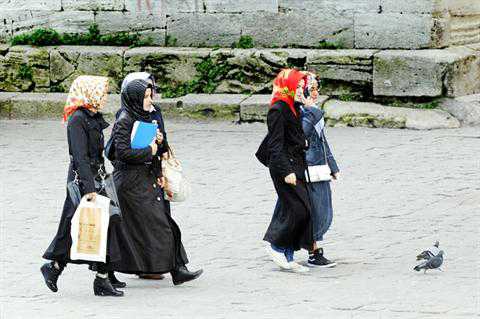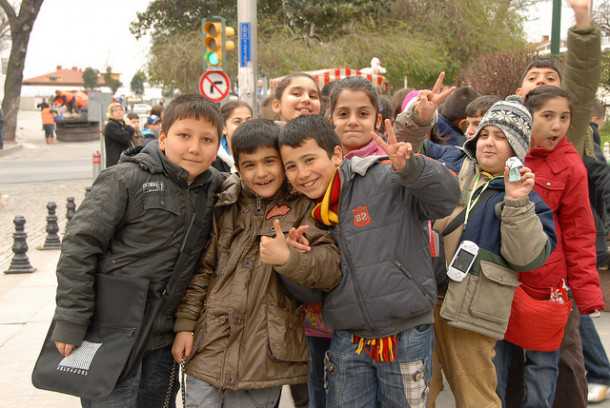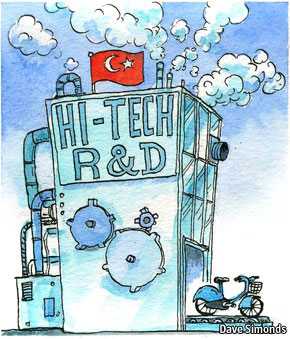As the West reduces its presence and influence in Africa, Turkey is using trade, aid and education to make inroads into the continent.
And it has even rebranded itself as an “Afro-Eurasian country”, as the BBC’s Esther Kahumbi reports

As the West reduces its presence and influence in Africa, Turkey is using trade, aid and education to make inroads into the continent.
And it has even rebranded itself as an “Afro-Eurasian country”, as the BBC’s Esther Kahumbi reports

Turkish women wearing headscarves walk at the Beyazit Square near Istanbul University.

ANKARA: Questions about religion will be introduced in two Turkish university entrance exams next year, a first in the mainly Muslim but staunchly secular country, an official said Tuesday.
Students will be asked to answer five questions on religion in the Transition to Higher Education Examination (YGS) on March 24, and eight questions in the social sciences branch of the Undergraduate Placement Examination known as LYS-4 on June 15, the official told AFP.
Both are standardised tests required to be admitted to higher education in Turkey.
“It is the first time that students will answer questions on religion in a Turkish university exam,” said the official on condition of anonymity.
Students in Turkish state schools are required to take religious courses.
The new exam questions however are controversial in a country which has non-Sunni Muslims, Christians and Jews, although 99 percent of the population is said to be Muslim.
In February, Turkish Prime Minister Recep Tayyip Erdogan said his government wanted to “raise a religious youth,” a comment that has touched a nerve, fuelling debates on an hidden government agenda to Islamise secular Turkey.
Erdogan is himself a graduate of a clerical school and the leader of the Islamic-rooted Justice and Development Party (AKP).
Secular quarters argue Erdogan’s conservative government is step by step imposing religion in every aspect of life, saying many restaurants already refuse to serve alcohol during the holy Muslim month of Ramadan.
They also criticise recent changes to legislation under which religious school graduates will now be able to access any university branch they like, while in the past they had only access to theology schools.
via Turkey university entrance exams to test religion | News , Middle East | THE DAILY STAR.
Turkish girls attend computer lessons at Kazim Karabekir Girls’ Imam-Hatip School, Istanbul, February 10, 2010.
ISTANBUL — As parents wait to collect their children from Mehmet Akif Middle School, one father appears deeply concerned. Recent announcements regarding newly Islamized curricula — ostensibly for training imams and other clerics — caught many parents by surprise.
“They will say, ‘put a headscarf on your child,’ and she’ll have to wear a longer dress. They will try to bring more backwardness into their lives. Nobody wants this,” he says. “We want our children to be educated following the principles of secularism. Until now it was like this and we were happy.”
Converting schools into religious institutions known as Imam Hatips is part of the Islamist-rooted government’s education reforms, which, according to some parents, represent a welcome change.
“We are a Muslim country and Imam Hatips are for teaching our religion,” says one mother donning a headscarf in accordance with her faith. “It is important for my child. I want my child to learn his religion. All this criticism is an exaggeration because we are a Muslim country, so religion must be in our education.”
Imam Hatips like this one, Prime Minister Recep Tayyip Erdogan’s alma mater and one of the oldest in Istanbul, were founded to teach imams. But the new curriculum, which combines normal education with hours of religious studies, are popular with Turkey’s religious population.
Combining Quran recital class with the normal curriculum means an arduous workload for the children, but teacher Azmi Dogan says Imam Hatips play an important role in Turkey’s pious community.
“Every child who leaves here is qualified to become an imam or a religious official,” he says, explaining that students are exposed to every field of Islamic study, from scriptural interpretation to the prophet’s words. “For the pupils this is not a problem, as their parents want their children brought up like this.”
A lengthy debate
Since their creation in the 1950s, Imam Hatips have been controversial in the debate about Turkey’s secular state, and many were shut down as part of the pro-secular, military-inspired crackdown on the country’s Islamist movement in the 1990’s.
Turkey’s ruling party pushed through the school reform act earlier this year to allow schools to specialize in religious education combined with a modern curriculum, provoking arguments in parliament and mass protests by secular Turks and teachers who say the law promotes an Islamist agenda and threaten education standards.
But Kenan Cayir, assistant professor of sociology at Istanbul’s Bilgi University, says the schools can have a positive impact.
“They promote an understanding that religion does not necessarily conflict with modernity, so religion and modernity can be together,” he says. “This is very controversial in Turkey, because in the secular-civilization narrative it is argued that religion does necessarily conflict with modernity, so we have to leave religion behind.”
The Islamist-rooted government officials say expansion of Imam Hatips is about restoring schools that were closed in the 1990s, a claim that has done little to curtail growing anger among some parents.
At one protest outside of a newly converted school, parents claim the government is imposing the schools on their children. Ali Boga, a member of parliament for the ruling AK party, describes expansion of Imam Hatips as the beginning of a broader movement.
“We are here as Imam Hatip graduates or as allies,” says Boga. “We will increase the number of these schools in records. We have the chance to turn all schools into Imam Hatip schools.”
The government hasn’t denied has such plans. Instead, Prime Minister Erdogan has slammed critics of schools while his education minister said opponents of reforms were either terrorist supporters or fanatical secularists.
The debate indicates that education could become another battleground in the increasingly polarized country.
via In Turkey, Religious Schools Gain a Foothold.

School Reopens In Turkey Amid Protests – Is Education Reform Promoting Islam?
School Reopens In Turkey Amid Protests – Is Education Reform Promoting Islam? Back to school in Istanbul – ( np&djjewell at flickr) RADIKAL/Worldcrunch

ISTANBUL – As children in Istanbul packed their bags this week to start a new school year, protests broke out against the controversial “4+4+4” education reform, recently implemented by the ruling Justice and Development Party (AKP).
Large crowds gathered outside the Istanbul imam hatip religious schools on Fatih Street to protest the new education system that extends mandatory education to 12 years: four years of primary school, four years of middle school, followed by four years of either secondary school or vocational training.
People opposing the reform fear that the new system will increase the number of children attending the imam hatip religious schools, which qualify as vocational training.
Members of the opposition Republican People’s Party (CHP) have also criticized the reform for depriving children of a basic scientific and humanities education. Students will be allowed to drop out of school after eight years, which critics say will only encourage child labor and prevent girls from pursuing higher education.
Protests also broke out in the capital city of Ankara this weekend, and up to 14 people were arrested for holding unpermitted demonstrations for the cause.
Nearly 17 million students and 800,000 teachers began Monday to implement the new education system.
The reforms are the brainchild of Prime Minister Recep Tayyip Erdogan, who slammed the previous education system for having “non-democratic” origins. In 1997, after the military overthrew an Islamist government, new secular leaders shut down many of the religious imam hatip schools.
Classes such as “The Koran and the Life of the Prophet Muhammad” have been added to the secondary school curriculum, and female students will be allowed to wear the headscarf during these classes.
“Human rights, citizenship and democracy” and “games and physical activities” have been added as compulsory classes. Texts books have been adapted for the new curriculum and 187 million copies will be delivered to students for free.
via School Reopens In Turkey Amid Protests – Is Education Reform Promoting Islam? – Worldcrunch – All News is Global.

Peddling religion
Why secular academics fret about an “Islamic bicycle”
Sep 15th 2012 | ISTANBUL | from the print edition
 “A BICYCLE that is produced with God’s blessings in mind and man’s interests at its fore is an Islamic bicycle.” The pronouncement made at a recent conference in Istanbul by Alparslan Acikgenc, a professor from the Yildiz Technical University, brought nods of approval from his colleagues. “A bicycle that is painted with substances harmful to humans cannot be Islamic,” agreed another professor.
“A BICYCLE that is produced with God’s blessings in mind and man’s interests at its fore is an Islamic bicycle.” The pronouncement made at a recent conference in Istanbul by Alparslan Acikgenc, a professor from the Yildiz Technical University, brought nods of approval from his colleagues. “A bicycle that is painted with substances harmful to humans cannot be Islamic,” agreed another professor.
While the exchange elicited a flurry of mirthful commentary, not everyone was amused. Mustafa Akyol, a liberal Muslim writer, called the idea of an Islamic bicycle an “expression of the self-isolating mentality that has stagnated Muslim thought.” Secular academics have long fretted that the mildly Islamist Justice and Development (AK) party, in power since 2002, is promoting Islam ahead of science. They point to the introduction this year of Koran lessons in state-run schools. The emphasis on religious education is part of a controversial overhaul of the national curriculum, which many argue flies in the face of the rigidly secular principles of Kemal Ataturk, Turkey’s founding father. This follows the appointments of overtly pious rectors to various state universities.
“For all their claims of being able to reconcile religion with modernity, Islamic movements in Turkey have signally failed to do so,” argues Ali Alpar, an astrophysicist at Istanbul’s Sabanci University. Mr Alpar is among a group of academics who resigned in protest from the country’s National Academy of Sciences last year after the government announced that it would henceforth be choosing some of its members.
In the event the government decided to let the country’s top science agency, known as TUBITAK, submit some of the names. Mr Alpar and his friends were unswayed. The agency has been steeped in controversy of its own. This erupted when it allegedly forced the editors of its science magazine to kill a cover story on Charles Darwin in March 2009. The move followed tweaks to TUBITAK’s charter that gave the government a greater say over its affairs. The agency later claimed that it had not censored the piece, blaming the change on editorial wrangles. But Mr Alpar says that an article on Galileo that the agency commissioned him to write was also spiked.
Suggestions that AK is steering Turkey towards Islamic rule are overwrought. And as the rest of Europe wrestles with the euro crisis, the Turkish economy continues to grow under AK’s steadying hand. Yet if Turkey is to remain competitive it needs to invest far more in research and development (the Directorate for Religious Affairs, which employs thousands of clerics, was allocated double the amount slated for TUBITAK last year). Alienating the country’s top scientists doesn’t help. “It is time,” says Mr Akyol, “for Muslims to rethink why early Islamic civilisation produced so much of universal value, from algebra to the lute, and why we hardly do that today.”
via Turkey and science: Peddling religion | The Economist.
